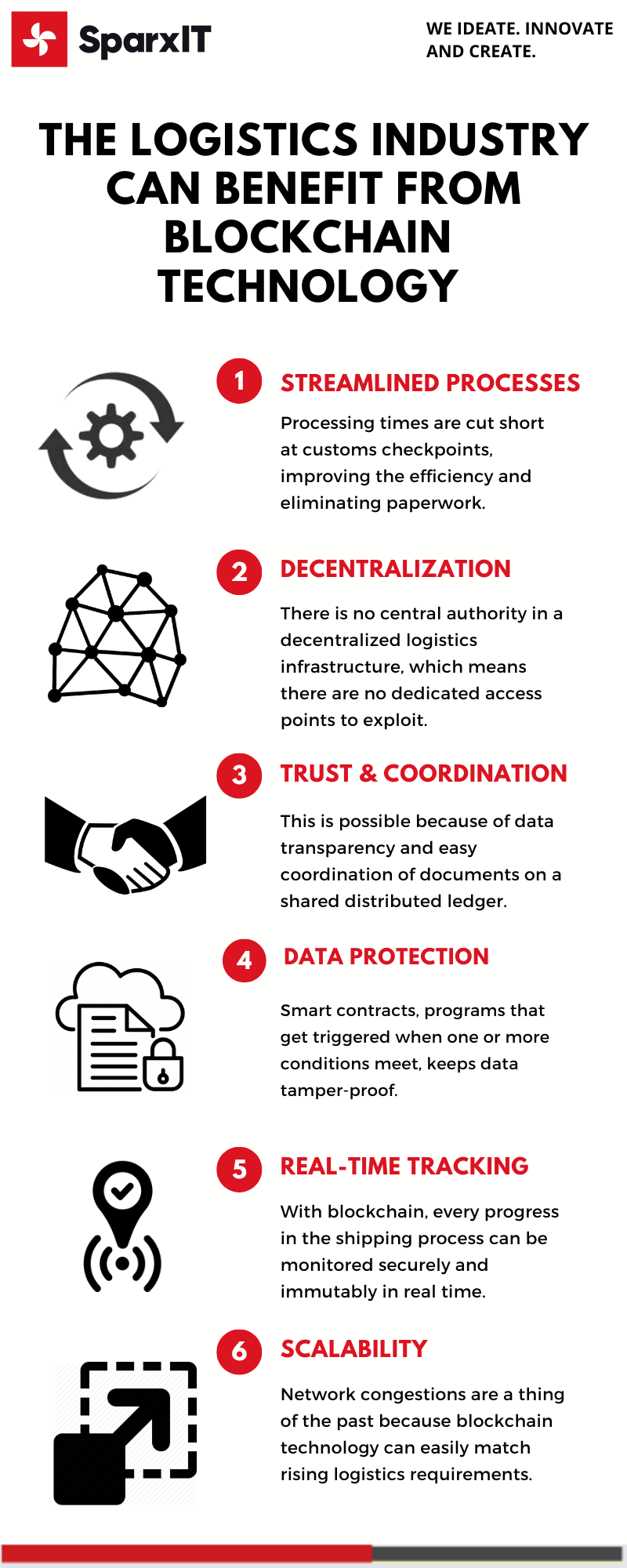The logistics industry is growing at a staggering pace each year. However, despite the lucrative payouts, companies are losing out on a significant portion of the profits due to a range of factors.
Issues related to efficiency and transparency are likely to occur with the involvement of multiple third-parties. However, proper logistics infrastructure can manage the complications that may arise, as long as the underlying technologies can handle the numerous middlemen.
Technologies like Blockchain have streamlined logistics and introduced new landscapes in traditional process infrastructure.
This blog post will dig deeper into the utilization of blockchain development solutions in logistics.
What Blockchain Technology Is All About
Blockchain is a DLT or Distributed Ledger Technology– a digital, public ledger that is decentralized and distributed over a network. Multiple participants manage this ledger or database on a network.
Each of them verifies and stores transactions and any related information. As a result, data is always accurate regardless of the access point used.
It is near to impossible to tamper data using Blockchain technology. The reason behind this is, the data is stored in chronological order within the digital ledger with a digital fingerprint, called a Hash.
Every time there is a new transaction in the Blockchain network, a new hash code is generated for the updated block of data.
Blockchain Technology in Logistics: A Futuristic Alternative
At its core lies the concept of decentralized data distribution, making this technology useful for a wide range of industries. Aside from crypto transactions, blockchain technology applications are revolutionizing logistics processes.
For instance, many businesses need to track the delivery of their products using their status history and geographic location.
Blockchain can serve these requirements by enabling couriers and clients access to this data through various features. These include order/delivery monitoring and updating status in real-time.
Many big names in logistics are already taking the initiative, partnering with a logistics app development company providing development services for blockchain development solutions.
Corporations across the globe have also joined the Blockchain in Transport Alliance (BiTA). They aim to explore and understand the logistics ecosystem better, while delving into the effects of blockchain on it.
How Can Logistics Industry Benefit From Blockchain Technology?
You may not be surprised to know that many blockchain development companies are already revolutionizing logistics.
Here are six ways through which Blockchain technology can advance logistics processes:

Quicker Processes
Conventional logistics processes involve endless manual validating and documentation turnover. This is a huge issue in logistics, and blockchain addresses it well.
The Distributed Ledger Technology takes over all the verification and approval-related hassles. It also eradicates errors, and prevents forbidden transactions or unsanctioned network changes. This speeds up workflow because logistics networks can concentrate on other important tasks.
Transparency Due to Tracking
Transparency is key in maintaining trust among distribution partners. Unfortunately, it is also a big concern in logistics.
By availing blockchain development services, logistics companies can ensure access to every piece of information in the network through blockchain. As a result, each transaction remains transparent and immutable. This helps mitigate probable trust-related tensions among businesses, something traditional logistics operations fail to accomplish.
Decentralization
The conventional procedures involved in logistics allow companies to restrict access to their data as and when they see fit. This often creates mistrust among parties due to ethical concerns around data falsification.
Decentralization reduces the chances of fraud by eliminating the role of any centralized authority. This is possible as long as data allocation remains equal and consistent among ledger users. Therefore, data monopolization becomes impossible, improving logistics.
Greater Efficiency Through Smart Contracts
Smart contracts are programs present on the blockchain that activate when the data meets certain pre-decided conditions.
One instance of a smart contract may involve the release of payment to the supplier, on the condition that the shipment arrives at the manufacturing premises.
In short, smart contracts in logistics app development effectively remove several steps that traditional transactions typically need.
Data Security
A blockchain offers remarkable security because one block connects to other blocks from both ends. Third-parties cannot alter that data these blocks contain because they don’t have the authority. In fact, no single block does.
The lack of a central authority improves the security in logistics. Users can monitor the source with the help of data gathered to shed a light on goods manufacturing processes, delivery location origins, and management.
Feasible Scalability
As far as scalability and expansion are concerned, blockchain technology is nearly limitless. You can expect there to be zero congestion, no matter how many transactions add to the logistical network. That means no bottlenecks!
Consensus mechanisms for large blockchains help maintain optimal performance. It is how an app development company ensures excellent synchronization levels.
Selecting a suitable blockchain development service provider is important because requirements vary depending on the project. Experienced companies know this, and are capable of implementing an end-to-end blockchain-based solution aligned to your business strategy.
To Summarize
Logistics can be more efficient and transparent with blockchain technology. Several successful blockchain development projects have resulted in increases in these two attributes because of blockchain development services.
The automation of administrative and clerical tasks provided by this tech will likely improve efficiency. The way it has been integrated with other technologies has created powerful tools for logistics, and this trend will continue.
Blockchain, IoT, and robotics, along with other cutting-edge technologies, could drastically change the monitoring and analysis of goods transfer. Though we need to overcome many challenges, blockchain has enormous potential in this sector.



